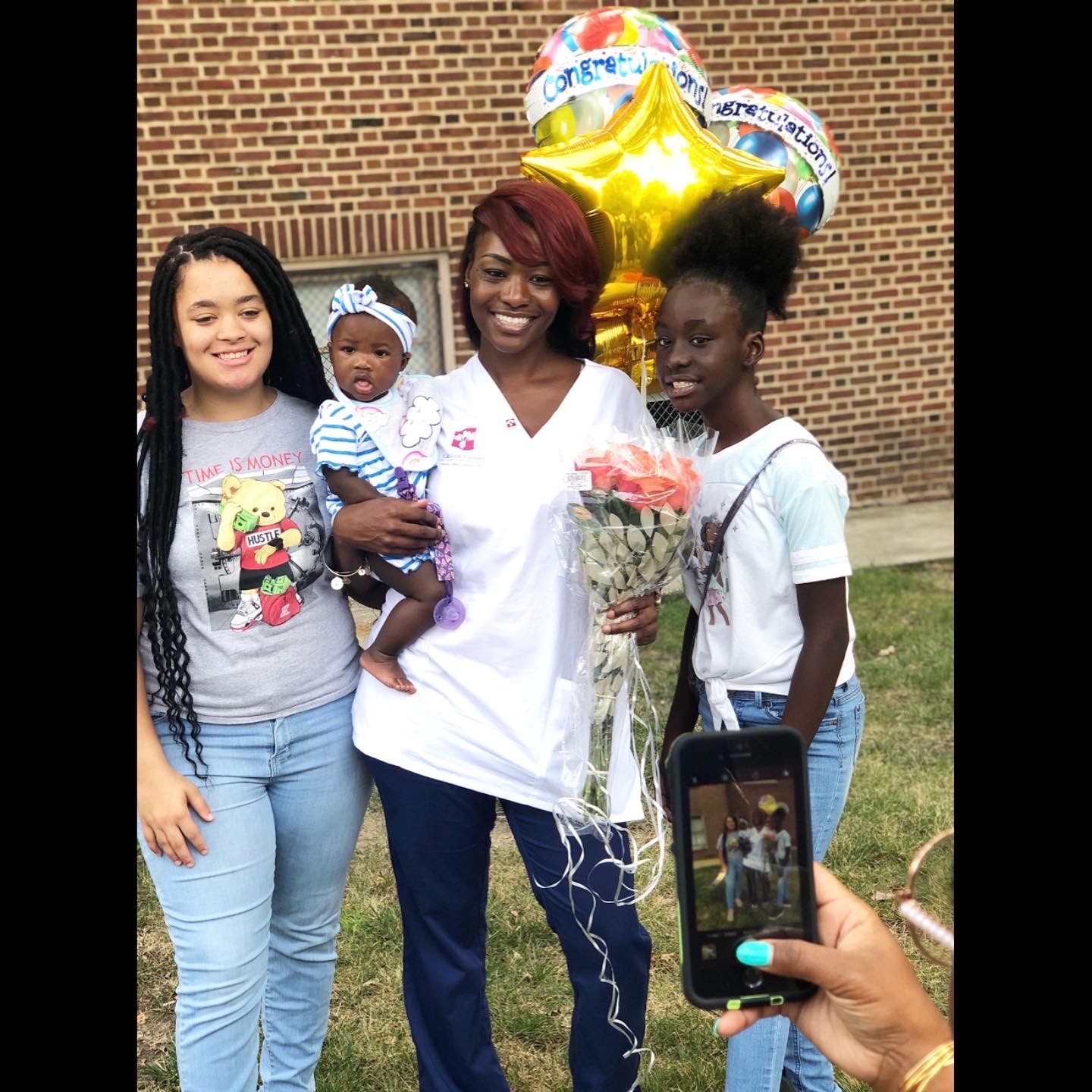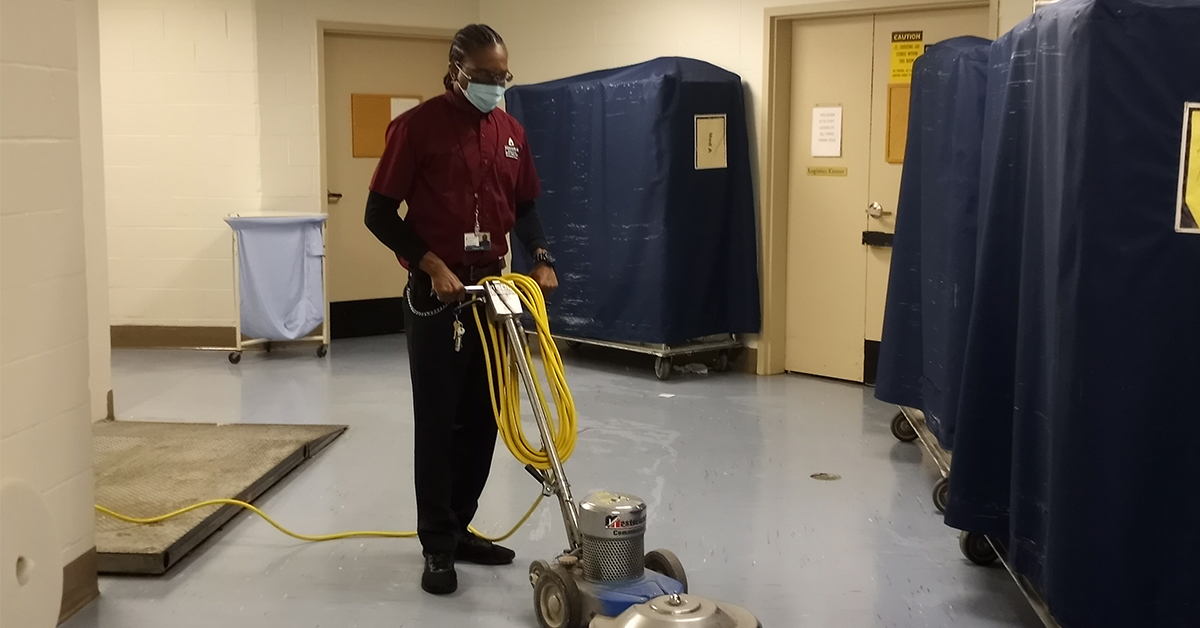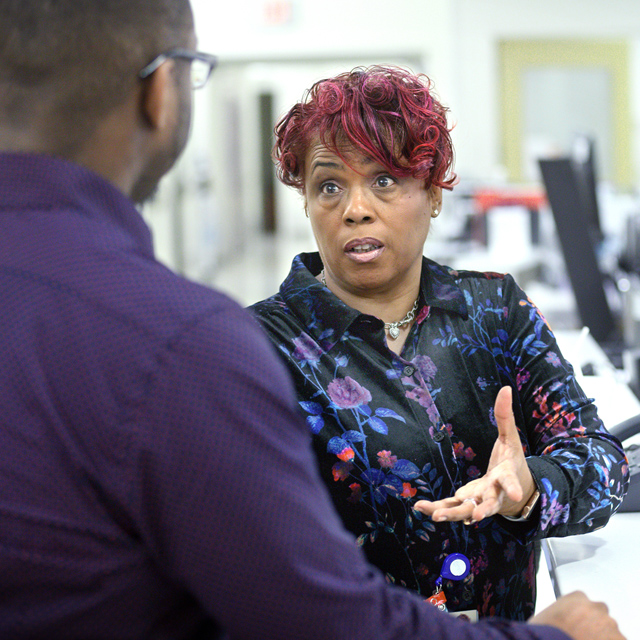Johns Hopkins Hospital nutrition assistant Tonya Harrison struggled with substance use disorder and homelessness for 35 years. When a friend who was in the recovery process asked if she would come to treatment, she decided to take the opportunity to get help. After two interviews with Marian House, an organization that helps women who are in need of housing and support services and their children, Harrison moved in and started to change her life.
“Marian House helped me become independent,” says Harrison. “I was dependent on others before I got here, and I was stuck for a long time. At Marian House, all my dreams became possible. I’m now working and have lots of opportunities.”
Marian House houses women for up to two years while providing behavioral health group counseling and individual counseling, according to employment coordinator Lara McNeil. It also provides job-readiness training and financial literacy classes. In addition, through collaborations with organizations like Johns Hopkins Medicine, Marian House helps women secure gainful employment.
“We help the women heal over time,” McNeil says. “We give them a new way of looking at life, and help them put tools in place that help them cope. They must be serious about making positive changes and commit to securing work.”
When a woman lives at Marian House, she is required to attend dinner every night and work on a rotating cook team to help foster a sense of responsibility, McNeil says. They also participate in receptionist duties and do chores around the house. About three months after moving into Marian House, the women start job readiness and financial literacy classes.
“They learn communication skills and how to set goals,” McNeil says. “They work on their hard and soft skills and practice interviewing to help build up their confidence. We teach them about job searching and networking, and assist them with building their portfolios. They are required to apply to at least 10 jobs a week.”
Harrison completed the job readiness program and was accepted into The Johns Hopkins Hospital’s on-the-job training program to be a nutrition assistant, someone who takes meal trays to patients’ rooms and then returns to pick up the trays. She was offered a permanent position in February.
“I love my job,” says Harrison. “I love interacting with the patients. I try to give them something to look forward to every day.”
Patient service manager Donte Adams says Harrison has been a great help to his team.
“Tonya always arrives to work on time, she’s pleasant and she’s always willing to lend a helping hand when the department is short-staffed,” he says.
Harrison says she is thankful that Johns Hopkins Medicine gave her a new opportunity.
“They saw something in me that for a long time I didn’t see in myself,” she says. “The whole process was just amazing. My co-workers help me out, and my supervisors listen and are very understanding.”
Harrison says she’s now celebrating two years of sobriety, and feels she can achieve anything she wants to achieve.
“The stars are the limit,” she says. “I cannot go back to my past. I have something to look forward to each and every day. I’m even thinking of going back to school.”
McNeil says that while the staff at Marian House guide the women, the women do all the hard work.
“I love to see them get what they want, be successful and be able to sustain themselves financially,” she says. “Collaborations with organizations like Johns Hopkins Medicine are important because many of our women have obtained employment that has enabled them to grow. They have great benefits, and there are options to move up.”
Ayana Andrews, a peer recovery coach at Johns Hopkins Bayview Medical Center, graduated from Marian House in July 2021.
“Marian House is one of the best programs for women,” Andrews says. “They bring us from dependence to independence and offer help in every area of our lives.”
Before Marian House, Andrews had been in and out of recovery for 20 years.
“I lost a significant other, and it was a wake-up call,” Andrews says. “I knew I could do it. I decided to put my recovery first and give back. Marian House helped me regain management of my life.”
Andrews says she wakes up every day with a sense of gratitude that motivates her.
“My achievements seem to never stop,” she says. “I’m proud that I graduated, and take it step by step. At Marian House, I learned how to cope with emotions. I had to learn how to go through what I’m feeling without acting on it and how to redirect the feelings. I learned it’s OK not to be OK.”
Andrews became a Johns Hopkins Medicine peer recovery coach this year. Through Marian House, she earned 208 hours toward her peer recovery position by working at a behavioral health center.
Andrews’ supervisor, Phoebe Rostov, a senior program manager, says Andrews is great at engaging with patients.
“Ayana is kind and caring, which is recognized by others,” Rostov says. “She provides excellent services. She has learned about community resources in a short turnaround time, and is participating in advanced training.”
Andrews says she’s grateful that Johns Hopkins Medicine supports continuing education.
“They give you the opportunity to move up. Training and education are so important. They’ve given me a second chance,” she says.
Joy Haywood, a peer recovery coach at The Johns Hopkins Hospital, graduated from Marian House in February 2016. Haywood says she struggled with addiction to opioids and alcohol before moving into Marian House. She says she had difficulty finding a job because of her background.
“I felt like nobody wanted me,” Haywood says. “I was feeling pretty low, but the Marian House didn’t let me stay down. They believed in me, and they made sure I didn’t stop believing in myself.”
Rostov is also Haywood’s supervisor. Haywood started her position as a peer recovery coach in July 2017.
“Joy is dedicated to assisting each patient with having the best possible outcome, and always uses a patient-centered approach. She recognizes how one’s readiness and overall life situation impacts an appropriate plan for ongoing treatment and support services,” Rostov says. “Joy uses her own story of lived experience with recovery to approach each patient with empathy. As a result, she is often our go-to person.”
At Marian House, Haywood says she learned to keep the focus on herself and her recovery. Now, she says, she has a great life. She has her own home, and enjoys decorating it.
“I want to be the best Joy I can be. More than money or anything, I want to see what it looks like,” Haywood says. “At Marian House, so many of us come through battered and bruised. We want to be productive, but the doors are closed. Working at Johns Hopkins is a second chance, and I’m worth a second chance.”



